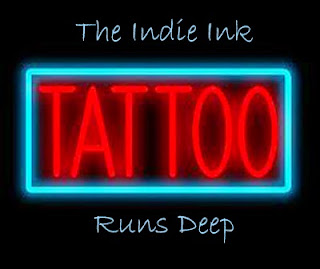We're happy to help Meerkat Press support the release of their latest title, What I Know About July by participating in their blog tour. And if you're at all into winning free stuff, they're running a giveaway where you can potentially win a $50 book shopping spree.
Every now and then I manage to talk a small press author into showing us a little skin... tattooed skin, that is. I know there are websites and books out there that have been-there-done-that already, but I hadn't seen one with a specific focus on the authors and publishers of the small press community. Whether it's the influence for their book, influenced by their book, or completely unrelated to the book, we get to hear the story behind their indie ink....
I have
an ever-growing collection of tattoos, some meaningful and some just things I
enjoy looking at, so I won’t bore you with going into every single one here.
Sticking to the top of my right forearm, I have a pumpkin and the word
“STORIED” in Scrabble letters. Like almost all my tattoos, they’re blackwork. It’s
not that I don’t like color, but black goes with everything.
Why a
pumpkin? Because pumpkins are awesome! They’re cozy like scented candles and
hot drinks, but also have fun spooky vibes. Halloween might be my favorite
holiday, but I love pumpkins (and horror movies and scary stories) all year. So
it’s also a good fit that my novel What I Know About July is coming out on
Halloween.
The
Scrabble tattoo was one I wanted for ages. I love boardgames (but HATE learning
the rules for new ones), and Scrabble is the best classic game for word lovers.
It took me a while to decide what word to get. For nerdy reasons, I definitely
wanted one with seven letters – because that doubles your score. I settled on “STORIED”
as a play on words with the actual meaning and the sense that writers are full
of stories. Because I only have German Scrabble at home and the letter values
are different, I had a friend in the U.S. take a picture with letters from her
Scrabble set to use for the tattoo.
~~~~~~~~~~~~~~~~~~~~~~~~~~~~~~~~~~~~~~~~~~~
Releasing today!
Mystery | Suspense | Contemporary Women
Simon Kemper, recently out of rehab
and experiencing moderate success with his band in Berlin, is haunted by a
stalker. July appears at every show, sends numerous postcards to his label, and
behaves as if she knows him well. Like she owns him. When she suddenly vanishes
after one of his performances, Simon becomes the prime suspect. His initial
goal is to clear his name, but as he searches for July, he begins a deeper
psychological journey. The threads of July’s disappearance turn out to be tangled
into every corner of Simon’s life: a trusted band member, a tenuous new love
interest, a resentful ex, and the self he’s supposedly left behind.
Narcissistic, insecure, and consummately relatable, Simon is the anti-hero of
his own life—trying to want to be better; hoping that’s enough.
BUY
LINKS: Meerkat Press | Bookshop.org | Amazon




















DHS_2138.jpg)






